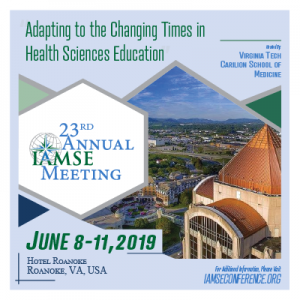
The 23rd Annual IAMSE Meeting will feature a host of new focus sessions and workshops throughout the entire meeting. One of our first-time sessions is Strategies for Integrating Lifestyle Medicine and Experiential Wellness into Undergraduate Medical Curriculum. This afternoon session will be given on Monday, June 10 and will be led by Shipra Bansal and Michael Zawada.
Focus Session: Strategies for Integrating Lifestyle Medicine and Experiential Wellness into Undergraduate Medical Curriculum
Time: Monday, June 10 from 3:30 PM – 5:00 PM
Speaker: Shipra Bansal and Michael Zawada – AT Still University – School of Osteopathic Medicine in Arizona
Lifestyle Medicine (LM) is a scientific approach to decreasing disease risk and illness burden. LM is recognized as the foundational approach to health by a growing publication of medical evidence. Dr. Bansal developed a core comprehensive approach to address the knowledge and skills of LM in medical school education. It is focused on expanding access to LM with a concentration on topics specifically attuned for medical students. These themes include nutrition, exercise/physical activity/ movement, Mind-Body Medicine, behavioral change, and self-care with periodic self-wellness assessments and care plans.
To address these skills and knowledge, A.T. Still University-School of Osteopathic Medicine in Arizona (ATSU-SOMA) has begun the integration of LM as a cohesive element throughout all 4 years of student education. The American College of Lifestyle Medicine (ACLM) learning objectives are incorporated with focused activities. Their faculty are involved in teaching and supporting an experiential learning model which will allow students to grow personally as well as professionally. The LM curriculum is designed to improve the resiliency and ability of our future physicians to deal with stress, depression, and burnout. This acquired understanding can be readily shared with their future patients. This focused session is designed to share the Osteopathic Wellness & Lifestyle (OWL) curriculum design with medical educators and describe our process.
Session Objectives:
• Discuss the current state of lifestyle medicine, and culinary nutrition in undergraduate medical education
• Develop strategies to integrate lifestyle medicine into their current curriculum
• Identify useful methods to teach students patient-care by teaching self-care
• Experience 3 distinct wellness activities that can be implemented in any educational setting.
Additional details about this and our other focus sessions, as well as registration information, can be found at http://www.iamseconference.org.
Thank you,